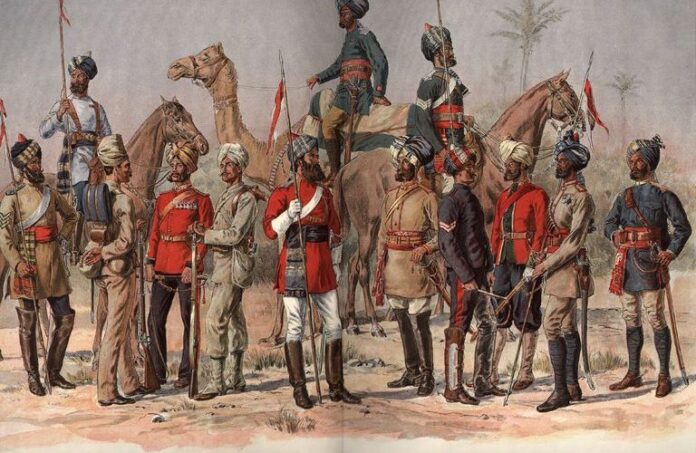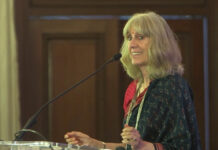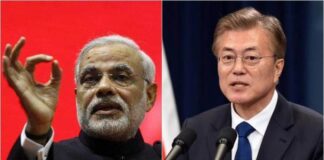Madhu Kishwar had invited me to her channel to talk about the above topic, after I had mentioned that 2 tribes in Namibia filed some years ago a class action suit against Germany for atrocities during its colonial rule there from 1885 -1918. Germany got summons from the court for pre-trial negotiations. After several rounds, Germany apologised and agreed to pay compensation.
By Maria Wirth
This article is based on material which I collected for the talk. It’s a bit lengthy, as it has three parts and includes screenshots and links. It is meant as input for further research on what can be done to get tangible justice:
Everyone knows about the horrendous Holocaust of Jews by the Nazis. The Jews were considered as sub-human, as “Untermenschen”, and systematically killed – deliberately and consciously.
In contrast, most people in the West and even many in India consider British colonialism in India as “good for the natives”. The British looked after the natives, didn’t they? They built the railways, gave them English education, laws, isn’t it?
I want to show here, that British colonialism was comparable to the crimes the Nazis did, and that this false narrative about the benevolent British rule in India needs to change and those responsible be held accountable. (I will here concentrate only on the British colonialism, but the French and especially the Portuguese colonialism in India was equally inhuman and prior to this, the Muslim invasions and Moghul rule).
The truth needs to come out and justice needs to be done for all those million Indians who were treated as subhuman, impoverished, humiliated and with no pangs of conscience, killed or left to die.
Testimonies about how bad the situation was in India
Just to give you a taste of how bad the situation in India was, I will quote here from Will Durant’s “A case for India”. He landed in India in 1930 at the age of 45. He had been studying the civilisations of the world, had read a lot about India’s great ancient civilisation, and wanted to get a direct feel of it, so he came for a visit. And he was shocked. He was so shocked that he felt, he needed to put his project about civilisations on hold and let the world know what was happening in India. He never thought a nation can let its subjects sink to such misery.
After going back to America he wrote a small book which can be downloaded from the net: “A case for India”.
Here is part of the introduction:
“I was filled with astonishment and indignation at the apparently conscious and deliberate bleeding by England throughout 150 yrs. I began to feel that I came upon the greatest crime in all history…
I know how weak words are in the face of guns and blood, how irrelevant mere truth and decency appear beside the might of empires and gold. But if even one Hindu, fighting for freedom far off there on the other side of the globe, shall hear this call of mine and be a trifle comforted, then these months of work on this little book will seem sweet to me.
For I know of nothing in the world that I would rather do today than be of help to India.” (Oct.1 1930)
Shashi Tharoor, in his book ‘Inglorious Empire” gives a similar account:
“Burke, in his opening speech at the impeachment of Hastings, also accused the East India Company of ‘cruelties unheard of and devastations almost without name…crimes which have their rise in the wicked dispositions of men in avarice, rapacity, pride, cruelty, malignity, haughtiness, insolence’. He described in colourfully painful detail the violation of Bengali women by the British-assigned tax collectors”.
Tharoor writes further:
In an extraordinary confession, a British administrator in Bengal, F. J. Shore, testified before the House of Commons in 1857: ‘The fundamental principle of the English has been to make the whole Indian nation subservient, in every possible way, to the interests and benefits of themselves. They have been taxed to the utmost limit; every successive province, as it has fallen into our possession, has been made a field for higher exaction; and it has always been our boast how greatly we have raised the revenue above that which the native rulers were able to extort.’
The salary of the Secretary of State for India in 1901, paid for by Indian taxes, was equivalent to the average annual income of 90,000 Indians.
Yet at the end his speech in Oxford in 2015, in spite of having made a convincing case for reparations by detailing, how brutal the British were in India, Tharoor ‘generously’ said that he is not in favour of financial reparations but just saying ‘sorry’ would go a far far far longer way, and he personally would be content with 1 British Pound a year as reparations for the next 200 years.
Why would he say this?
Rajiv Malhotra, who undoubtedly did great work for the Hindu cause, inexplicably also does not want to give the British even a little financial pain. In his speech in the British Parliament, he called those Indians who want reparations “rabble rousing, overemotional and bombastic people, just looking for instant populism”.
Basically, Malhotra conceded defeat before fighting, since he felt that Britain will anyway never admit guilt and pay compensation. He said this in front of British parliamentarians, whose facial expressions are interesting to watch, “Let me tell you, Britain will never give even a small amount of money as a symbolic thing and come up with “we are guilty, we are ashamed’ and all that. It’s not going to happen.”
Why would he do that?
Doesn’t he feel that integrity demands that Britain owns her crimes and that his countrymen deserve justice? For example those millions who were starved to death due to forced cultivation of opium, indigo and massive food export to Britain or those shipped out as indentured labour to plantations around the world, replacing the slaves after the abolition of slavery in 1833?
Doesn’t he feel that it should be rubbed into the British that India is ‘poor’ and not number 1 economy only because of them?
Testimonies how rich India was
Let me quote Arnold Hermann Ludwig Heeran, a German historian (1760-1842):
“India has been celebrated even in the earliest times for her riches.” The wealth, splendour and prosperity of India had made a strong impression on the mind of Alexander the Great, and that when he left Persia for India, he told his army that they were starting for that “Golden India” where there was endless wealth, and that what they had seen in Persia was as nothing compared to the riches of India.
The writer of the article “Hindustan” in the Encyclopedia Britannica also remarks that India “was naturally reputed to be the seat of immense riches.”
Even in 1700 AD, after the colossal, painful loot by Muslim invaders, India was still rich, Aurangzeb was as wealthy as all the European kings together. The common Hindus had suffered greatly. They were highly taxed, their temples destroyed, their knowledge burned, humiliated and beheaded in millions.
For these crimes also acknowledgement and reclamation is needed and it seems to come now slowly in the form of reclaiming ancient temples – sadly, against a lot of resistance by Indian converts to Islam, whose forefathers in all likelihood converted under great duress and who are now fully brainwashed into their new belief (also fostered by the British), which includes seeing Hindus as “the worst of creatures”(Q98.6) …
Now first to the question:
How exactly did the British manage to drain India’s enormous wealth?
Utsa Patnaik, JNU Prof, studied this question for decades. She came to the figure of 45 trillion $ by using the commodity export surplus as measure and applying an interest rate of 5%.
India was producing many goods. Now, in normal practice, when you export something, you get gold, forex or goods back into your country in return for your export. India was since ancient times a surplus exporter, and therefore had a lot of gold and riches. This inflow, however stopped, when the Company got from the Moghul in 1765 the right to collect taxes in the areas which it controlled. Not only did the British extract 80 to 90 percent taxes, but from these Indian taxes, the British importer, the Company, paid the imported goods. This was truly sinister.
Prof Utsa Patnaik writes that the East India Company from 1765 onwards, allocated every year up to one third of Indian budgetary revenues to buy a large volume of goods for direct import into Britain, far in excess of this country’s own needs. These goods were highly priced in cold countries and for Britain they were free, paid for by Indian taxes… they represented international purchasing power, as Britain re-exported to Europe and America what they did not need and got in in return food grain, iron and other items for free.
When the EIC merged with the Crown in 1861, it got even worse. Now basically ALL export from India was paid for by Indian taxes, not only the export to Britain. The government in London asked those who wanted to import from India and who earlier had dealt with India directly, to deposit gold or sterling with the Bank of England and instead issued ‘Council Bills’ with the equivalent rupee value which were sent to India. The Indian export houses and producers got paid from the Indian tax collection which was budgeted as “expenditures abroad”. The gold and forex payments disappeared in the Bank of England, which was founded and owned by Nathan M Rothschild.
Prof Patnaik writes, that even as recently as from 1900 till 1928, India had after America, the second largest merchandise export surplus.
Further she says, ‘Indians were deprived of every bit of the enormous purchasing power they had earned over 175 years. Not even the colonial government was credited with any part of India’s huge gold and forex earnings against which it could have issued rupees. This sleight of hand, namely, paying producers out of their own taxes, made India’s export surplus unrequited and constituted a tax financed drain to London.’
Mass consumption was squeezed for export. This export included opium to China and Indigo, which caused terrible famines, in which it is estimated, some 25 million Indians perished. Each one dying a slow death.
In 1904, food grain consumption was 210 kg, by 1946, it was down to 137 kg.
“Indian masses suffered a severe nutritional decline and India inherited a festering problem of unemployment and poverty,” Patnaik says.
And from then on, the world knew about India only that it was “a very, very poor country”…
What mindset does it need to do this to a people?
It is the same mindset with which German Nazis mercilessly herded Jews and Gypsies into the gas chambers.
When will humanity realise that we all come from the same source?
Let me again drive home the inhuman mindset of those who consider themselves superior, which applies to all Abrahamic religions.
Here are excerpts of an eyewitness account, a Dutch Merchant by name of Jacob Haafner, who was in Madras during the famine of 1871, translated by Jacob de Roover of the University of Ghent, Belgium.
He describes at first, how those starving people looked. I instead give a photo of the famine in Madras in 1876
He writes:
….One saw thousands of such human beings walk around, young and old, man and woman. With their last strength, they had come to the square for alms from the rich, but the doors remained shut, so that one after the other collapsed. Dead bodies and those dying lay on top of each other as on a battlefield, from all sides one could hear the crying of the suffering; begging they raised their hands to the inhumane Englishmen on their balconies, who stood there revelling with their whores, and who made the hunger on the square even more unbearable because of the food they held in their hands.
Dying is nothing. But to see your wife, your children, your parents waste away from starvation, and see them die in terrible convulsions, that is more than dying. Oh! If only I think of the ghastly images that I saw in Madras, chills run down my spine. Never will I be able to forget them…
But, one may ask, was it completely impossible to support these poor, innocent Indians? Were there no provisions in the city?
Oh yes! For those who had the money to pay the extortionate prices of the English and their agents there was food enough! The warehouses of the English Company and some English merchants were amply provided with all kinds of grains, sufficient to feed double the number of people who were then in the city and this for a longer period of time. The rich bought what they needed, but for the penniless Indians, who had left everything they possessed behind when they fled to Madras, there was no other fate but dying from hunger. No one cared. Their disastrous condition did not in the least impress the petrified hearts of the English, who made no attempt whatsoever to prevent the dying of these masses of people, and showed no compassion at all.
These Christians, who pride themselves on their humanitarian religion … alas, talking, singing or whistling they walked through the dead and the dying, with that rude and hurtful arrogance so characteristic of them. From their carriages and palanquins, they looked down on the perishing natives with a look of contempt, while the latter were lying in the dust, struggling with death, or convulsively breathing their last.
I paid close attention; sometimes I stood still for half an hour to observe the English passing by, and I cannot but declare openly that I saw no trace of compassion on the face of any of them, for the innumerable wailing beings lying on the ground before them. Even worse: I saw their ladies, those sentimental, tender-hearted creatures sit in their palanquins with the same cool indifference when they were carried right through this battlefield. Perhaps there were some among them who would faint at the sight of a spider or a mouse! Yes, I saw these European ladies strolling dauntlessly through this field of death, laughing, talking and frolicking with their company or lovers – shocking!
More details will be told in Part 2…
This article first appeared in www.mariawirthblog.wordpress.com and it belongs to them.







